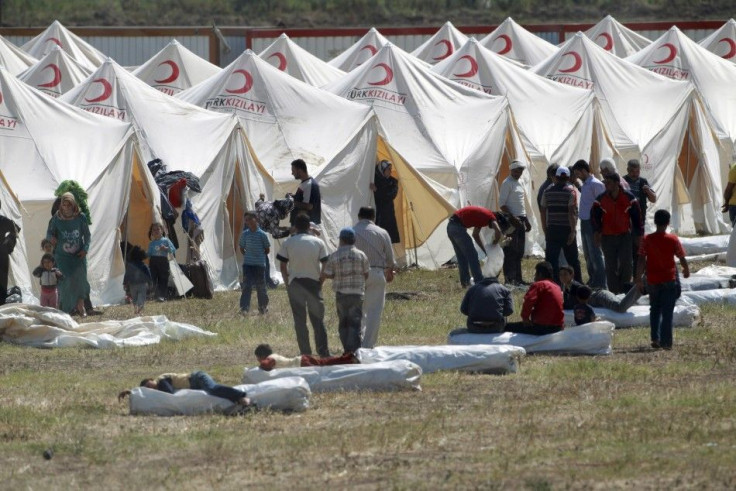Turkish Military Intervention In Syria Threatens Border Region Stability

Hundreds of thousands of Syrians who fled the civil war in their country and found refuge in southeastern Turkey are now worried that they could soon be stuck in a new conflict. Several Syrians living on the border of Turkey said in interviews that armed men in their communities, some Kurdish and others affiliated with the Islamic State group, were planning on taking advantage of a potential Turkish military intervention in Syria by using the opening of the border crossings to send weapons and fighters to aid their respective fights.
The three Syrian sources, all of whom requested to remain anonymous for security purposes, crossed into Turkey within the past month, some from Tal Abyad and others from Aleppo. They said in interviews with International Business Times that they feared that the Turkish intervention in Syria would spur a conflict in their new homes that they have spent years trying to avoid.
"Turkish border security is a huge issue and has been for a long time," said Andrew Tabler, an expert on Syria from the Washington Institute for Near East Policy, a think-tank based in Washington. A border operation "would not only put a lot of Turkish troops in danger and make them susceptible to attacks by ISIS, but would endanger a huge population living in the border region."
Turkish President Recep Tayyip Erdogan chaired a National Security Council meeting Monday to discuss options for intervention in the ongoing Syrian war. The details of that meeting have not been released by the government, but local media reports suggest Turkish troops would occupy a 70 mile long, 20 mile wide buffer zone in Syria. Both the daily Yeni Safak, a mouthpiece of the government, and the newspaper Sozcu, which is among Erdogan’s fiercest critics, ran stories saying the Turkish Army had received orders to send soldiers over the border.
Hundreds of thousands of Syrians are currently living on the border with Syria, some in refugee camps and others in apartments in towns such as Antakya, Reyhanli and Yalladagi. The operation could lead to the downfall of the region's relatively peaceful security environment, Tabler said.
Syrian refugees on the border have for the most part found relative peace living in Turkey. One of the sources interviewed for this story said she had "no desire" to move back to Syria and that "any military intervention" near her home could force her to move back to Aleppo.

It is unclear if the government, which controls the refugee camps, would be able to transfer the refugees to a different, safer area inside the country if the intervention took place.
There is another option for the refugees that Turkey is considering: sending them back into the beleaguered country. Meanwhile, there is a chance that a Turkish military intervention would spur dissent among the Kurdish population living along the border, Tabler said.
It is still unclear when the Turkish military intervention would move forward, though some sources within the Turkish government have said that it could take place within the next month. The main aim of the operation would be to create a safe zone that stretches across the southern Syrian provinces of Deraa and Suwayda, including the city of Deraa, where the Syrian uprising began in 2011.
Despite claims by officials in the government that the intervention would be focused on stopping Islamic State group militants from entering the country, analysts say the operation would focus first on pushing back Kurdish fighters from the border.
In a speech last Friday, Erdogan vowed that Turkey would not allow Syrian Kurds to establish their own state in Syria following their victory in the border town of Tal Abyad earlier this month. During the battle in Tal Abyad, Erdogan accused Kurds of ethnic cleansing.
“I am saying this to the whole world: We will never allow the establishment of a state on our southern border in the north of Syria,” Erdogan said. “We will continue our fight in that respect whatever the cost may be.”
Thousands of Syrian Kurds fled to Turkey during the battle over Tal Abyad, and many still remain in the border region in Turkey. They join an already well-established Kurdish population in the region that has deep political rifts with the government. Any military intervention in Syria against the Kurds would threaten the peace process between Ankara and Kurdish political parties, experts said.
The border region between Turkey and Syria also is home to a large population of Islamist extremists loyal to the Islamic State group, also known as ISIS or ISIL. The militants use the border as a safe haven, an area away from the fighting that allows them to regroup and obtain new weapons to bring back into the battle zone.
In recent months, some security analysts have called for a buffer zone on the Turkish border, claiming the establishment of safe zones could lead to better humanitarian access. Jordan is already in the midst of discussing how to set up a buffer zone on its border with Syria, the Financial Times reported Monday.
Michael O'Hanlon, an expert on Syria from Brookings Institute, a think-tank in Washington, said in a new report that the U.S. and its coalition allies, including Turkey, should establish one or two buffer zones "in relatively promising locations, such as the Kurdish northeast and perhaps in the country’s south near Jordan."
© Copyright IBTimes 2025. All rights reserved.





















